Garry Kasparov does a Q&A in a Reddit Ask Me Anything
When it comes to the world chess champions who do not hold back on speaking their mind on any topic one can fathom - Garry Kasparov's name is the first that comes to mind. So naturally a Reddit AMA (Ask me Anything) is something one cannot afford to miss. Surely everyone will not agree to every single opinion he might have, but at least the chess, tech and AI aspects are something which is definitely worth a read. Kasparov shares everything from what he has for breakfast these days to his thoughts on if Carlsen will be able to cross his 20+ long years of domination in the world of chess, how The Queen's Gambit promoted chess among the masses and much more. Photo: Grand Chess Tour
Kasparov answers
Reddit (wordplay on read it) is known to be the 'frontpage of the internet'. Unlike facebook and twitter, it is not a social media, in simple words you can call it a bulletin board where you can customize what you wish to read and be aware of. You can find here almost anything and everything. Previously in 2014, Nakamura and Carlsen have done AMAs (Ask me Anything) on Reddit. A Reddit AMA literally means what it says, anyone can ask about anything, there is no paywall or a criteria to ask your thoughts. However the guest is not obligated to answer all of them. They choose the questions which they feel are good enough and then reply to them via text. Yesterday at around 9:30 p.m. IST Kasparov did an AMA with the entire Redditors (people who use Reddit).
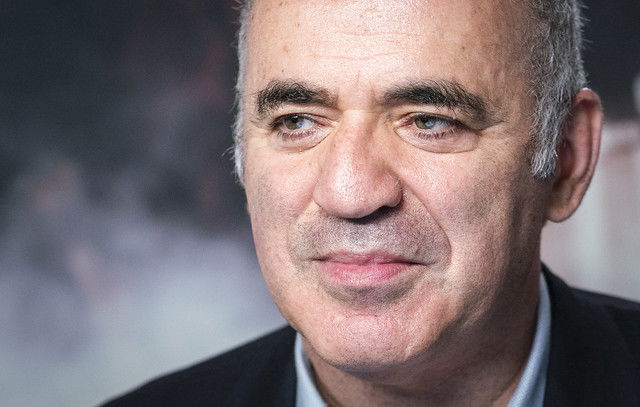
While the questions covered chess, AI, tech and Kasparov's personal habits/choices/preferences and other topics, we are mentioning here only questions and answers relevant to the site. If you wish to go through the entire AMA, please visit here.
ballthyrm: While you are well known for your fight against Deep Blue, I found "Kasparov versus the World" a lot more interesting. Do you think there is a lot of research and systems to be developed to allow humans to collaborate that way just as they did in this match against you ?
Garry Kasparov (GK): Great question, and while the "wisdom of the crowds" isn't really so effective in expert systems like chess, it was a pioneering experiment in real life for crowdsourcing and combining human and machine thinking and coordination in real time.
Thebunin: What would you say are the most common misapplications and misunderstandings of AI by humans, both in chess as well as outside of it?
GK: To pick the biggest one, it's that AI is a threat instead of a powerful technology like any other that is agnostic, and good or bad depending how we use it. It's a very harmful outlook, because we need to be more ambitious and more optimistic so we invest more, learn more, and get the benefits, not just suffer the slow-moving consequences of disruption and automation.
Ms_Riley_Guprz: What is your opinion of Chess960 or other variations of the game? Which is your favorite, or which looks like the most promising for the future of chess?
GK: It's great, if I have trouble calling any variant an improvement on the real thing. I like openings and the rich history and work involved in researching improvements in the opening phase. It's a vital part of the game. But Chess960 is fun and fresh and a welcome addition to the chess world.
blackferne: Mr. Kasparov I had the pleasure of losing to you at a Simul at SXSW in 2019. Personal chess highlight. Anyway I was curious about your thoughts on whether the right to privacy can really exist in the age of big data and big tech. It seems like Facebook knows so much about people who don't even have accounts. And everything online is tracked, made into a commodity, and sold. Will privacy exist in 20 years?
GK: Yes, but not in the sense we understand it today. I wrote about this a lot in my Avast blog, looking at the history of tech and privacy going back to the telephone. We have to watch the watchers, which is still possible in a democracy. And keep in mind the greatest threat is how comfortable we are giving away all our data in exchange for convenience, not a nefarious company or KGB stealing it. You use your face or fingerprint to open your phone!
We can acknowledge, but also mention that there is light on the horizon, with GDPR, CCPA in California introduced - these are good developments, and it is important we are continuing to have a privacy debate, so ultimately, in 10 or 20 years, privacy protection may actually be stronger than it is today, as we are still in the rather unregulated beginnings of the social web. It's a constantly shifting landscape of tech advance and regulatory and social norms.
vaperboy1337: What is your greatest passion besides chess?
GK: Chess is a jealous mistress! No insult to my wife and family, who are of course my top passion, but no I don't have any other big objects of attention other than consuming information.
Lukenzz: I want to recall your match against Topalov in 1999. With all due respect, have you really predicted all the moves before capturing the rook on h8 ?
GK: Yes, I had to see the rook was hanging on h8 to play it. The moment I played 24.Rxd4
Kasparov - Topalov, Wijk aan Zee 1999
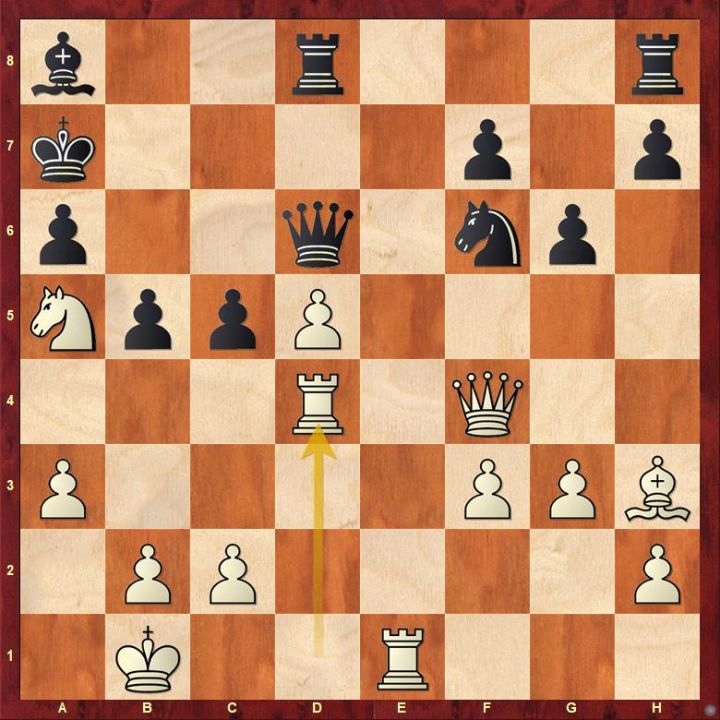
I visualized the position after 37.Rxd7.
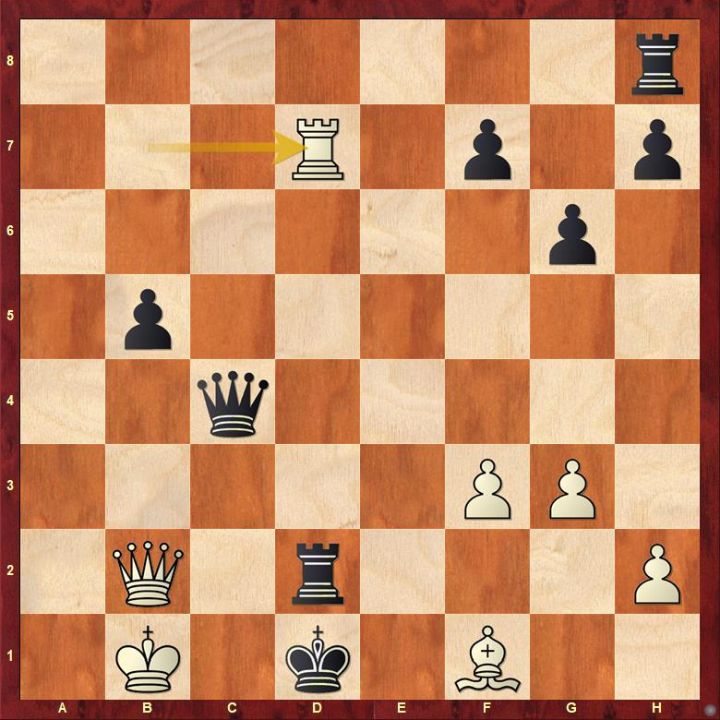
Not every single move or variation between, of course, but that final key moment came to me like lightning.
herpDerpSlerpaWerp: Do you think current era chess champions like Magnus have the staying power to match or exceed your time as champion for 20+ years?
GK: Highly unlikely, although Magnus clearly has the requisite talents of creativity and discipline. But elite chess keeps getting more competitive, with more players from more places, more events, as well as more distractions and opportunities. I was 42 and still ranked number one when I retired in 2005, feeling like I had no more to achieve in the chess world. 10 more years is a long time, but if Magnus stays hungry, and it is still making him happy, perhaps with the rise of a top challenger to keep him interested, he might. But the pace of change is his enemy so I'm skeptical.
atopix: Did you know that in r/AnarchyChess you are known as "Garry Chess, the inventor of chess"?
GK: I have long ago given up trying to keep track or understand all the memes with my name or image. Eventually they will be better known than I am!
ViktordoomSecretwars: Do you think your great rival, Anatoly Karpov has somehow become underrated in the pantheon of greats? Everyone talks about you, Carlsen, Fischer, rightly so but Karpov is sometimes the forgotten man. His career speaks for itself but maybe he not having any connections to the West or being reserved by nature or not having a hollywood story like Fischer did kind of works against him?
GK: Karpov had his glory in the USSR and currently enjoys the favor of Putin's Russia as well. I don't think it's a coincidence that such renown comes at the cost of a more global appeal.
WilliamKiely: What's something important you changed your mind about recently?
GK: That “boring”, practical AI is possibly more important than all the moonshots and sci-fi stuff that makes headlines. I still believe in ambition being a key to success, but we’re missing that AI is already here, already improving our lives, not becoming Terminators or wiping out jobs. Automation taking jobs is always a challenge with tech, but it creates jobs, too.
Applesauce27: Have you ever had any issues with the KGB? Maybe particularly around the time you played Karpov?
GK: All my life has been entangled with the KGB, from my days as a Soviet player traveling abroad and facing a Soviet favorite in Karpov to my work as a pro-democracy activist.
Cryptographer-Wooden: How did the USSR as a nation state supported you through your rise in the chess world? Do you reckon that if you were born in other country you would have had the same success? Read your book How life imitates chess. Quality read
GK: Thanks, it's a good book!
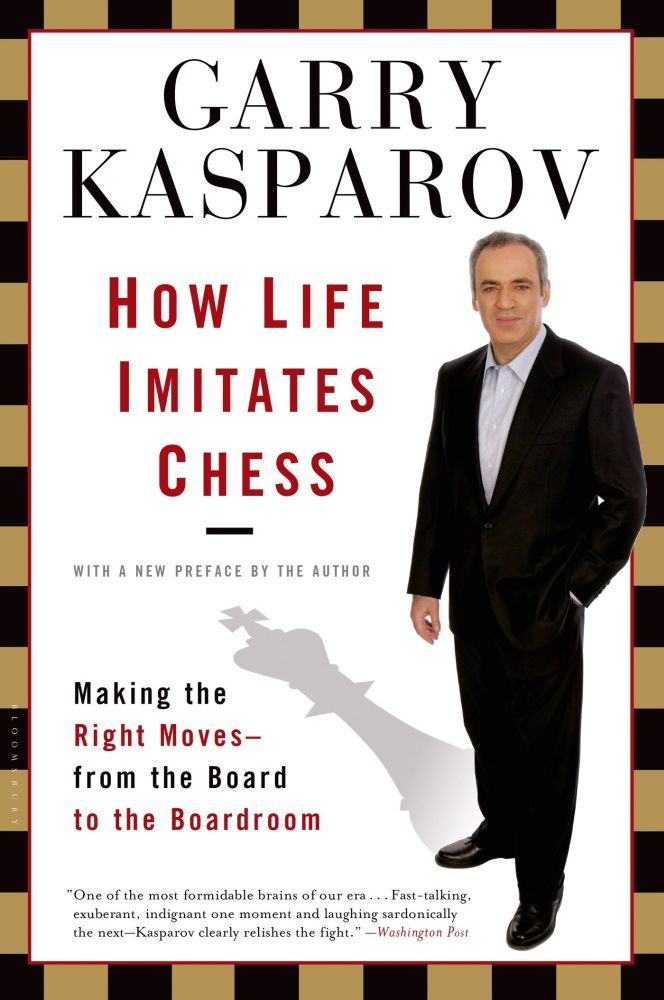
The USSR considered chess a way to promote the superiority of the Communist system, and I benefited from that emphasis, as did every Soviet player. We had conditions for training and competition that were unmatched elsewhere. Mostly, though, it was that chess was everywhere and so the top talents were discovered and promoted efficiently. There's talent everywhere, but not opportunity.
wrapped_in_clingfilm: E4?
GK: ..c5!
FieryMaedhros: What should us (regular netizens) be aware of when it comes to cyber security? And in what sectors is the need for cyber security most important, in your opinion?
GK: That you have a responsibility not only to defend yourself by being alert and following best practices, and what I call "digital hygiene." Most people know what they shouldn't do but don't follow it, sort of like a diet! More broadly, that as a citizen you have a role to advocate for security, privacy, and everything. Big companies and big government are eternally pushing and pulling, and regular netizens influence them both as consumers, social media users and, if you’re lucky to live in a democracy, as voters and activists. Speak up with your habits, your money, and your votes.
Trust is the biggest issue, and people are already complacent about things like bank fraud and hacks of credit cards, identity theft, etc. The problem is we need to have trust in our democratic processes and those will be increasingly part of the online world, so security has to be both good and trusted. For example, in the US, election security is excellent, but it was still easy for Trump to convince tens of millions of people it isn’t. So it’s not just a cybersecurity problem, it’s a cybersecurity communications problem. Also true of any crisis, like the pandemic.
Wevewonit6timeslad: Who is the nicest chess player you've met? Also, what is the best advice you can give to new chess players?
GK: Nicest? Not something I paid much attention to in my playing days! But for friendly I would pick out Mikhail Tal for sure. Today, Aronian always has a kind word and smile.
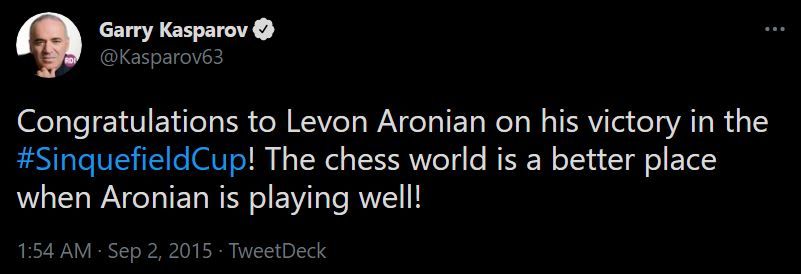
Best advice is to play. Many new players get obsessed with studying or reading about chess, which can be like reading books about dancing to become a good dancer. Players play!
Applescause27: 1. Could you have beaten Bobby Fischer if both of you were in your prime at the time of the match?
2. Do you think the world chess championship format should be changed so that it’s more about playing for the win rather than playing for the draw?
GK: No interview could be complete for years without this one! I don't like these "time machine" questions because chess evolves and players learn and improve, especially across several generations. Fischer was a titan, ahead of his peers like no other before or since, but still knew less about chess than elite teenagers today.
As for changing the World Championship format, I don't see how. I like matches as the best way to determine the champion, and you can't eliminate draws without changing the rules of the game.
Luvil_: Are you aware / have you seen Fredrik Knudsen's video essay regarding the history of Deep Blue (and by extension, your association with it)?
GK: No, I haven’t seen it. If there are any revelations that I didn’t include in my 2017 book Deep Thinking I’d be surprised. Maybe someone can tell me if there are.
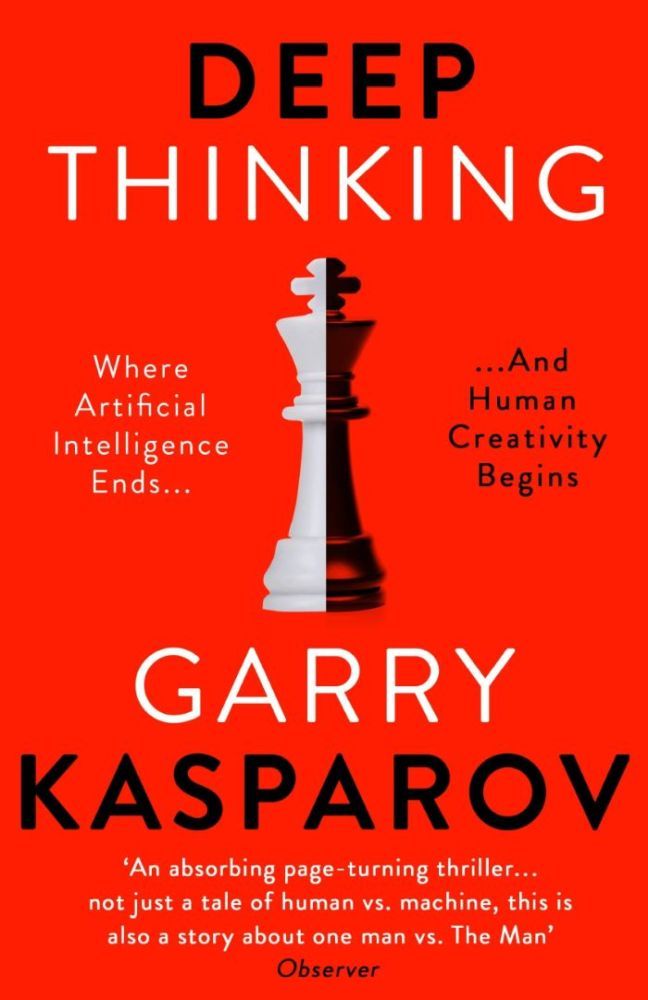
BerimboloMaster: What do you think of the evolution of chess from 2000 to today? How do you think it’ll evolve in the future?
GK: Players get better, we understand more, it goes on forever. The game isn't going anywhere, it's more popular than ever, and people will always want to know who is the strongest human so machines aren't going to "kill" it or whatever. People still hold their breath when the 100m dash is run, or even the marathon. It's about human competition and spirit.
halofixers: How do you think the chess decision-making of current top grandmasters compares to the great players of the past? For example, if Magnus and Botvinnik played a chess match where they were both placed in a bunch of late middlegame positions where white and black are totally equal, who would win more games?
GK: Always bet on the later generation in these hypothetical matchups. Knowledge increases over time, the game gets richer and the players get better. Aside from a few technical endgames perhaps, everything is connected to that expanding base of knowledge and understanding.
MaliciousWaffle: In your opinion, what is the most underrated chess opening in top level chess?
GK: Nothing stays underrated for more than a moment in elite chess.
ManuelRuiCosta: How's living in Croatia?
GK: Wonderful, in NYC right now but looking forward to heading back to the Adriatic shores in the summer!
Large-man-eats-fries: You often talk about the benefits of technology and advances in complexity and effectiveness of our algorithms.
Are there any applications of new technologies, specifically in the field of machine learning, AI and algorithmic decision making that you believe pose risks to democracy, when in the hands of either dictatorships or by accident in the hands of corporations such as Facebook, Twitter etc.?
GK: First, don't blame technology! Humans will always have the monopoly on evil, so we have to make sure we are holding people accountable, that the chain of responsibility doesn't end at a black box of algorithmic decisions. We create, we choose, we are responsible. And that means holding bad actors or exploitative companies responsible for any threats.
ButterMcToast: If you can't beat them, join them : how? What can we do to improve our relationship with AI or social media in a way where we regain some agency in the relationship? What is the biggest misconception or little known fact that could help people participate more in the development of AI or social media, especially in regards to the many direction(s) it can develop?
GK: Start with an injection of reality, that it's not "Us vs AI", it's people on both sides. There is no "AI ethics", only human ethics using technology, whether it's a hammer or a gun or an internet connection or a self-programming algorithm. Insisting on human accountability is the key to keeping AI under control. There's no "the algorithm did it", that's a cop-out and a dangerous one.
UncontrolledManifold: Did you watch The Queen’s Gambit? What did you think?
GK: It’s as authentic as I could help make it! I was a consultant on the show, creating many of the important game positions as well as on making the tournament scenes and Soviet scenes as realistic as possible—although of course some Hollywood drama was required. It was a lot of fun, and seeing it become a huge success for showrunner Scott Frank and star Anya Taylor Joy has been great for chess. I wrote in TIME that Beth Harmon has probably done more to promote chess than all the real world chess champions combined! You can find my conversation with Scott Frank in my Avast video series here:
Manaleaking: He gets asked this in every single podcast and interview lol. He likes that it accelerated the growth of the game.
GK: Every. Single. One. (But yes, it's been great for promoting chess, so I cannot complain.)
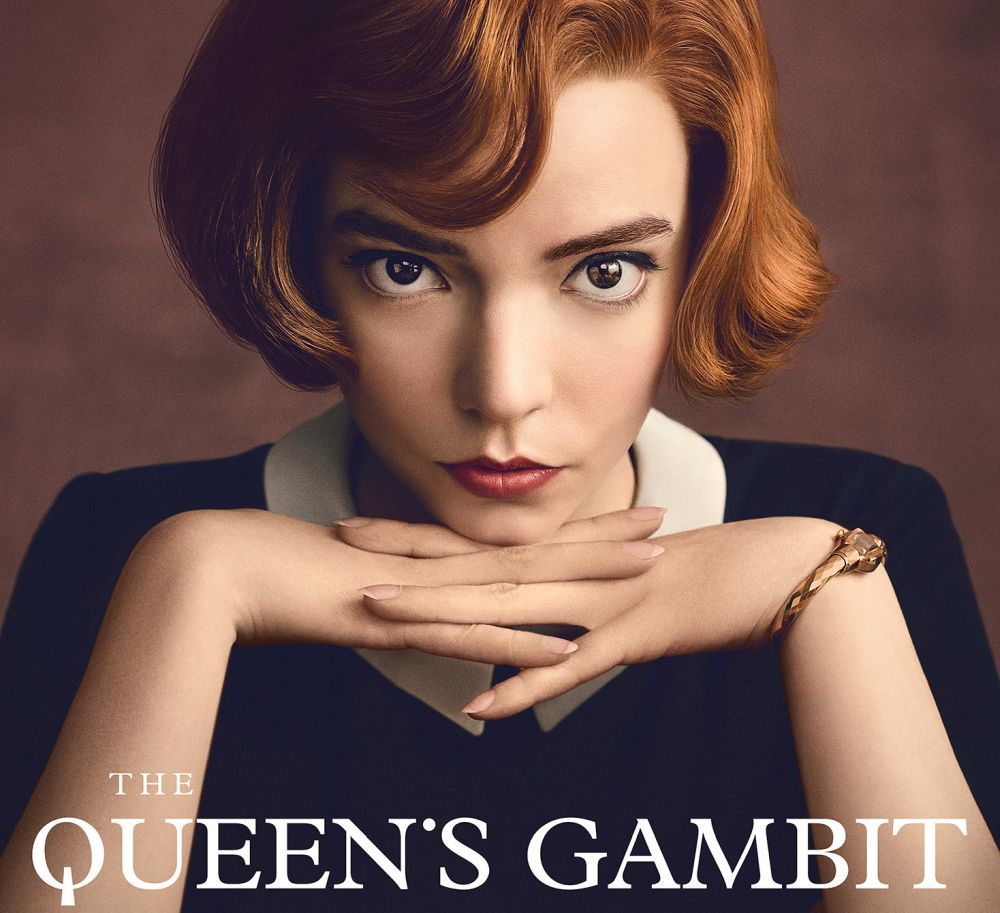
neu_jose: What is your favorite thing to eat for breakfast?
GK: Coffee! (Regular milk, please, no funny stuff.) Yogurt with honey, with walnuts. A far cry from the heavy regular breakfast of salmon and bread in my younger years!
FrontierBrainJace: What benefits are there for AI to the huge amount of personal data amassed and processed, and what threats might it pose?
GK: This is a good example of the two-sided sword of most modern connected tech. AI is incredible at finding patterns in data, and we can use this to improve everything from radiology to traffic to education. For AI to work, it needs to be fed with huge amounts of data, to learn about human behavior and act based on this. While this offers many opportunities for us, companies and developers behind AI technology need to act ethically, and that means the data they process and use needs to be protected. We need transparency on how data is collected and how it is used to create trust and security for the user, and this is an essential field of research in science and businesses at the moment, so we can profit from AI instead of being exploited by it.
lauchs: Given that people already cannot agree on basic reality, do you see any hope for us once deepfake technology becomes commonplace? What is to stop dictators or even less scrupulous political parties using made up video to justify all sorts of humanitarian rights infringements? If the only way to prove a video is fake is in any way technical, we can surely expect "fake news!" From anyone who disagrees...
Anything we can do or hope for?
GK: Tech is a sword and a shield, and with Avast I'm on the shield side! It's always this way, tech threats come early and it takes longer to develop defenses than to create weapons. Remember when email spam was going to be the end of the internet?! As usual, it's not about trusting tech, it's about transparency and trusting the people who watch the watchers.
Deepfakes are a risky development, and how common deepfakes will become greatly depends on how simple it will become to create them. Once the process of creating deepfakes becomes simpler, we could see an uptick in the number of deepfake videos produced.
On the other hand, cybersecurity companies are enhancing their detection techniques, such as inspecting metadata to determine whether a video is real or a deepfake. For example, researchers are now working on the possibility to compare natural video recordings of a real person with deepfake videos, and can determine if mimics are not typical for a person, so might have been faked. Of course, deepfake creators will improve their capabilities, too, and it will be a cat-and-mouse game like we see already in the cybersecurity field today.
In the hands of a dictator, deepfakes can be worrying, and what we need, besides technology that can detect deepfakes, will be consumer awareness and education so people understand that online content cannot always be trusted.
terrys87: As someone whom believes deeply in technology, do you believe in Bitcoin?
GK: Very much so. It's a way to wrest some control from big tech and government bureaucracies. It can restore some balance by giving power to "plain folks." Cryptocurriences are a bit of the wild west now, so I understand it can look dangerous and confusing, but I'm convinced they are only going to become more important and powerful and in a way that is positive for individual freedom and society.
the_world_is_amazing: What was going through your head when you lost the match to Deep Blue? Were you excited that technology had advanced that much or were you more worried about what this could mean for the future?
GK: If you watch the video of my resignation you don't need much imagination to know what was going through my head!
BadgerCraft: Google has demonstrated their lack of ethical accountability when it comes to AI with the pushing out of Timnit Gebru. From your perspective, what ethical stop gaps need to be implemented in AI to ensure that global corporations are held accountable to the programs they are developing?
If you're unable to answer that one - what are your thoughts about AlphaGo and how do you think AI can help improve society?
GK: You must separate things. On one hand, programs to advance their business agenda and more theoretical algos that can apply to anything. The "ethical gaps" aren't in AI, they are in the humans who make it. It's like yelling at a mirror because you don't like how it looks. Hold people responsible for bad outcomes and you will get better results. If no one is held responsible, it will be abused.
cardlygiro: As a casual chess player, I find the first 3 - 4 opening moves to be very boring and predictable. A mere formality to get to the real action when pieces are in better position. I play it safe with the 'Sicilian defense' against good players or attempt a 'fools mate' against a novice player. Suggestions for how to make the opening game more exciting and fun?
GK: Don't play any opening moves you don't understand! This is a point I wanted to emphasize when overseeing training materials for my new Kasparovchess site, that casual players can worry too much about opening moves, theory, names, etc. Just develop your pieces normally, control the center, and castle and don't blunder anything. Get to the fun part, the attacks and defenses. When you aren't winning or losing because of tactical blunders anymore, then you can start indulging in openings to get the sort of positions you like, etc. I love openings and theory, but it's mostly a distraction for casual players and beginners who just need to follow the basics and play as often as possible to let their own mistakes be their best teacher.
Poisoned-Pawn: What's your biggest regret so far in your career?
GK: Two answers. One, that I am very happy with my life now so having regrets seems wrong, because if I'd done things differently I wouldn't have the same life now. You can learn from your mistakes without living in an alternate universe. More specifically, I've always said that breaking away from FIDE in 1993 was a mistake that was bad for the game.
TheSeattleSeven: How long do you think we have until with have AI that's on par with human intelligence?
GK: AI and human intelligence are awkwardly juxtaposed thanks to a century of sci-fi and robots. But it's not useful to think of them as similar. AI is just a set of powerful tools to make our lives better, which is why I prefer to call it "augmented intelligence." AGI, or "artificial general intelligence" is not in range at all and talking about autonomous or "conscious" machines is really a distraction, or for philosophers. Interesting, but not practical.
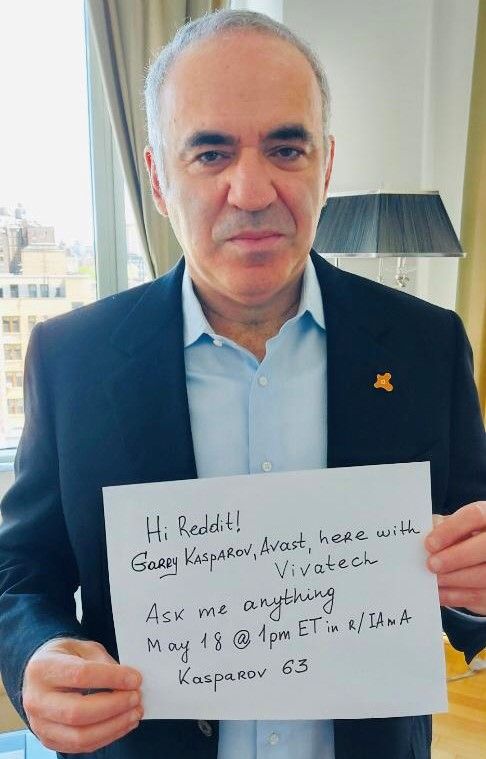
About this AMA
This AMA has been organized with Viva Technology, The 2021 edition will take place on June 16-19, both in-person in beautiful Paris and online worldwide. To keep you waiting until June, several past and future VivaTech speakers, game-changers from the tech, innovation and science sectors will take part in an AMA to answer your questions about how innovation will impact our future. You can also follow VivaTech on Twitter or Instagram.
Links
Follow Kasparov on: twitter and facebook.




